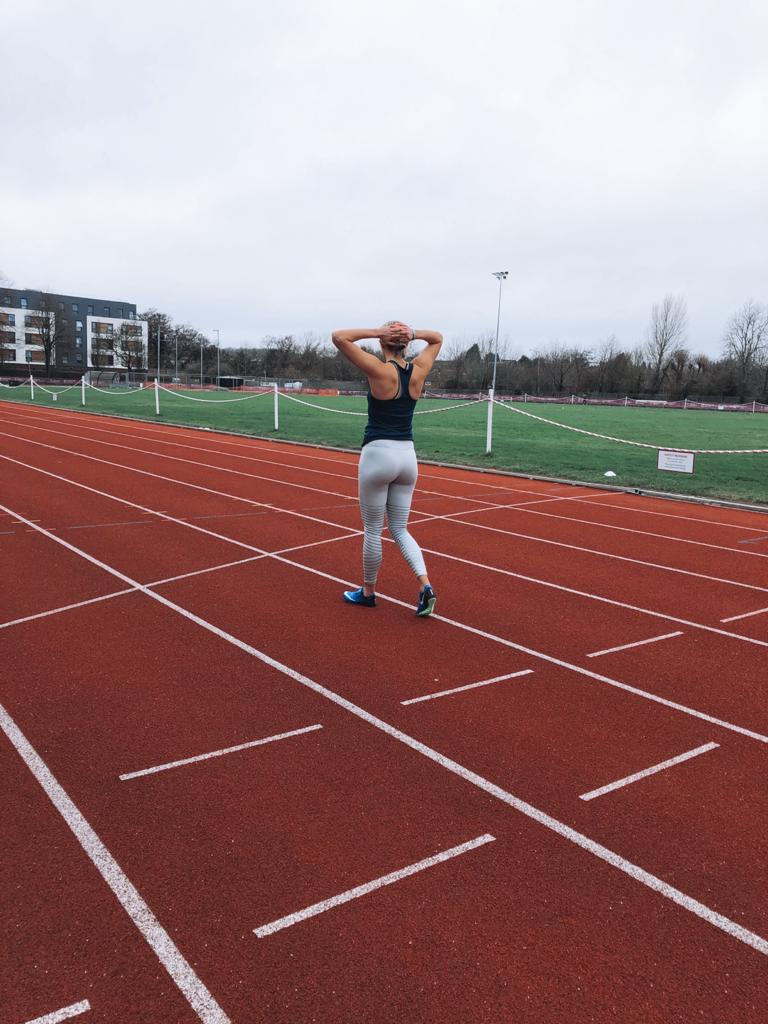
Ah, December. It's cold, it's dark and training is getting harder. Whatever sport you do, December tends to represent the middle of winter training and probably a lot of time spent at the training ground. With 7 events to fit in, Heptathletes have learned a thing or two about long training days. With that in mind, here's some top multi-eventer tips for surviving those double (or triple!) session days.

"I set goals for every session I do and I try to stick to them. Therefore, I give purpose to what I do even if it’s a long session, I stay focused and time goes quick!"
Marie Wattel, Olympic Swimmer & World Medalist
Plan ahead
Picture this. You're three hours into a really tough session, it's been raining and now you've got to do gym. You've forgotten your lifting shoes, your socks are soaked from running on wet grass and you haven't brought any snacks. From experience, this is not a fun situation. Winter training is hard enough, without being stressed, cold or hungry.
Over time, situations like this can really take their toll on your ability to train effectively. Depleted energy or forgetting your spikes/kit impacts the level of intensity you can bring to the session and overtime this can add up to a lot of lost opportunity for improvement.
Check and double-check your training plan so that you know exactly what you'll need for each session. Work out whether you'll have time to come home to eat between sessions or if you need to take a meal with you to the track. Pack lots of high energy snacks (bananas, cereal bars, dried fruit, malt loaf etc) as it is better to have more than less. Keep spare socks and shorts in your kit bag so that you're ready for all weather scenarios.
"Prepping for the day is so important; sometimes we have 3-4 sessions a day, so you need to have enough snacks, clothes as well as the right shoes. From experience, trying to sprint in high jump spikes isn’t fun..."
Natasha Smith, England Heptathlete
Train smart
Get up. Grind. Never sleep. That's what YouTube military motivational videos will tell you. But there's nothing impressive about a mentally drained, sleep-deprived and demotivated athlete.
Different sessions will require different degrees of mental and physical intensity. You only have a limited amount of energy available, so you'll need to allocate your effort. Talk to your coach about the aims of the session - don't go eye balls out in an easy tempo session because that will only fatigue you for other, higher intensity sessions later in the week. In the same vain, make sure you know when you need to be bringing your A Game.

Communicate
This point is very important for multi eventers, who tend to have different coaches for different events but is also relevant for all athletes, who will often have multiple coaches/supporters within their training set up. It's important to let each coach know what you have been doing elsewhere during the week to avoid overtraining or duplicating exercises which could cause injury or simply wear you out more than necessary.
When coaches know what the rest of your week looks like, they can tailor their session to be complimentary. This way, you can get the maximum out of your body without exposing it to a higher risk of injury.
Keep it simple
When you have a lot of sessions to fit in on one day, you can leave the track feeling totally overwhelmed by all the technical information you've been given. Writing down 2-3 cues which resonated with you after each session can help to simplify and consolidate what you learned in the session so that you can pick up where you left off last time. It can also help you to clear your brain so that you don't have a million thoughts running around your head by the time you get home after a long day.

"I have found by increasing my recovery like getting regular physio treatment and having more of a stretching routine has really helped my body be able to manage well for hard training."
Ellen Barber, Great Britain Heptathlete
Make time for recovery
Training multiple times a day will take its toll on your body. It's important to put your body in the best position to cope with the training that you are going to be throwing at it. Moreover, the benefits of the hard work you are putting in only come when your body repairs, recovers and adapts. That's why recovery is as much a part of your training as the sessions themselves. Examples of good recovery strategies are:
- Stretching / Yoga
- Foam rolling
- Having a regular sports massage
- Taking an Epsom Salts bath
- Getting 8+ hours of sleep per night
- Having a form of protein after a hard session
The importance of recovery also means that it is ok to take a day off. Many athletes fear the consequences of missing a session but actually, you will gain more from fewer, quality sessions than more, poor quality sessions. If you're feeling run down, drained or burned out then speak to your coach about it. There will be times when you need to train under fatigue but they can help advise you on when it is time to push through and when it is time to take a break.
"Preparation for training is as important as the session, the main thing is fuelling and refuelling, making sure you got enough food to train hard. Ensuring you are replenishing those systems for the next day or next session"
Zak Skinner, Great Britain Long Jumper
So there you have it. 5 tips for surviving winter training and those long, multi session days.
Eat, sleep, train, repeat: Top tips for surviving long training days


Comments